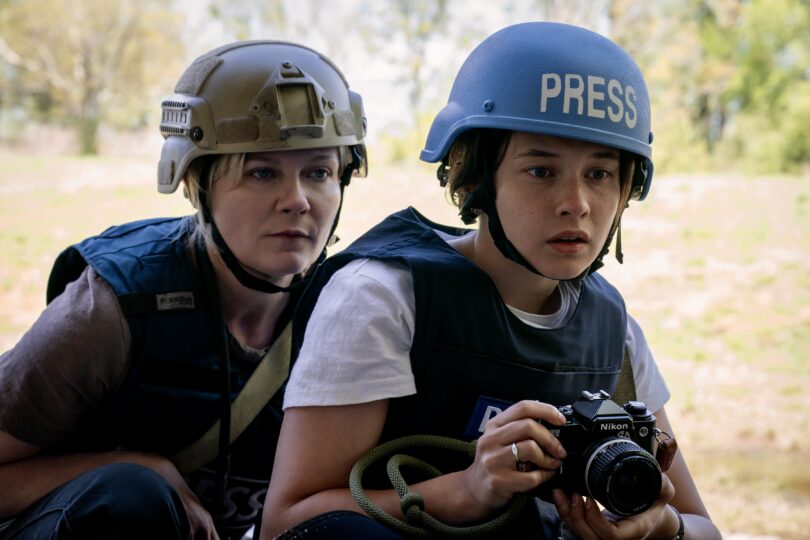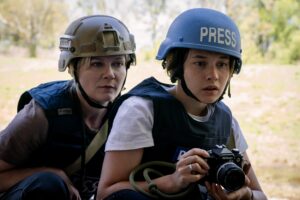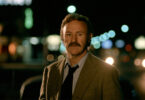For those paying attention, the current political climate of the United States is, um, troubling.
I know: Thank you, Captain Obvious.
But that’s why “Civil War” (R, 109 minutes, in theaters) hits awfully close to home. Well, that’s the biggest reason.
Written and directed by Alex Garland, who helmed the superb A.I. sci-fi chiller “Ex Machina” (from, believe it or not, 10 years ago), “Civil War” dives straight away into the midst of a war between rebel fighters, including the Western Forces of California and Texas, and the U.S. forces still under the control of the authoritarian third-term president (Nick Offerman!).
It’s not immediately clear who the good guys are. It’s not immediately clear what caused the split, how long the war has been going on (unless I missed that tidbit of information), or who’s winning.
This, I assume, is intentional, with Garland suggesting that, to a degree, this information doesn’t really matter. Here Garland depicts war as brutal chaos, where morality can get lost in the shuffle, where evil can thrive, where no one exactly “wins.” And, with this film, Garland, who’s British, suggests that this is where America could be headed if things don’t change for the better.
Sure, “War is hell” is an obvious message, and there might be those who think Garland just uses it as an excuse for a violent action movie intended as blockbuster entertainment – especially since the film has been promoted as a “thrill ride.”
I respectfully disagree.
“Civil War” has a lot of violent action; it’s suspenseful, intense. But it’s not really an action movie in the sense that the action is the main attraction. Garland uses violence as a means to a much larger end that should leave moviegoers disturbed and, at times, sickened; that should leave us challenged to think rather than feeling any kind of welcome catharsis. The final shot, which could be misinterpreted as celebratory, is stunning in its irony.
The story focuses on three veteran war journalists, Lee (Kirsten Dunst), Joel (Wagner Moura) and Sammy (Stephen McKinley Henderson), and an aspiring photojournalist, Jessie (Cailee Spaeny, star of “Priscilla,” and a scene-stealer here), who idolizes Lee.
The four are traveling by car more than 800 miles to Washington, D.C., with hopes of an exclusive interview with the beleaguered president. Not only are they in great danger by driving through war zones, it’s suggested that, even if they make it to the capital, the president, apparently not a big fan of journalists, might have them shot. (If it isn’t apparent beforehand whom Offerman’s character is representing, this should help.)
By allowing us to accompany the quartet on their journey, Garland shows us four people – Lee and Joel, at the height of their careers; older, physically slowed Sammy, at the end; young Jessie, just beginning – conflicted about the horrors they encounter.
As war correspondents, they are tasked with experiencing the ugliness of war, to capture it in words or photos to bear witness for their readers (and history). But what motivates them to take on this job?
While all four at various points experience fear and revulsion at what they see, Joel and Jessie also clearly experience an adrenaline rush from the danger and challenge of their work. “I’ve never been scared like that before,” Jessie says at one point, “and I’ve never felt more alive.”
In another scene, reminiscent of the recent (must-see) documentary “20 Days at Mariupol,” the journalists are in the middle of an urban firefight. Jessie, eagerly clicking away, captures a dramatic shot of a soldier cradling a shot-up comrade. “It’s a great photo, Jessie,” the war-hardened, disillusioned Lee says. But, to what end? Is this something to celebrate? Will it serve the public? Raise the profile of the photographer? Both?
It’s a moral gray area, and, in a way, it’s in that same area that Garland is traversing. Some will see this movie as exploitative and crass. Others will see something deeper, much more admirable and important in it. Count me in the second group. **** (out of four)
** Click here for Tim Miller’s previous movie columns for Cape Cod Wave **
Please like Cape Cod Wave on Facebook.
Cape Cod Wave Magazine covers the character & culture of Cape Cod. Please see our Longform stories.
Tim Miller is co-president of the Boston Society of Film Critics and a Tomatometer-approved critic. He teaches film and journalism at Cape Cod Community College in West Barnstable. You can contact Tim at [email protected] or follow him onTwitter @TimMillerCritic. Or you can ignore him completely.

































